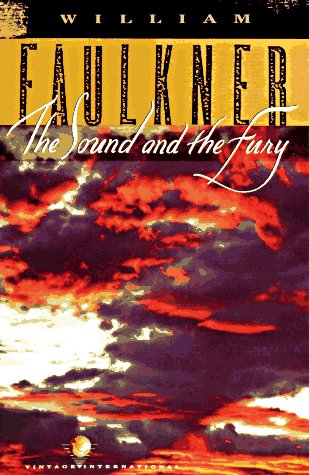
William Faulkner
What a read! Faulkner is a total headache...if you let him be, but brilliant at the same time. This book has been on my shelf a long, long time, and although somewhere back in the gene pool we are related (this correlated to me liking his stuff, how??), it has never been something that I was easily drawn to. Notoriously difficult. I still can't believe this is Katie's favorite author. I must admit, I'm a Faulkner virgin. Thus, I had nothing else to compare this to, nor really knew what I was getting myself in for. I sought guidance alot online when the storyline was too convoluted for me. I do, however, highly recommend it -- if nothing else, just to appreciate Faulkner's signature style.
This is the story of the Compson family, a dying member of aristocracy in the South. On the surface, it is about 3 brothers and how their sister, Caddie, affects each one of them. It's about family : good, bad and ugly and how each of us are affected by the clan that we come from. It's told from different points of view, each with a differing style.
I've included a bit here that I stole from someone else to give you a jist:

The Devil in the White City: Murder, Magic, and Madness at the Fair that Changed America
Erik Larson
I am always a sucker for a good historical non-fiction, so this book ranked right up there for me. I was not only able to fly through it (thanks to some long flights), but I was captivated with the story and all that I was learning. This book includes two parallel stories that took at the same time: during the World's Fair in Chicago, IL, 1893. First story being about the extraordinary events that took place surrounding Chicago winning the bid for the World Expo and all of the unusually difficult odds that were beat to pull this fair together. I can't say that I knew much about this historical event before, but now I totally have an appreciation for the thrust this Fair gave mankind into the 20th century. Can we say Ferris Wheel? Shredded Wheat? PBR? The second story was about a psychopathic doctor who built a torture palace and murdered many (mostly) women during the time the Fair was in town. Each woman's murder being a remarkable feat.
Both stories are so well written, so meticulously researched, that both are to the point of being otherwise unbelievable. I truly enjoyed reading this book and highly recommend it for anyone knowing very little about the World's Fair in Chicago.






No comments:
Post a Comment